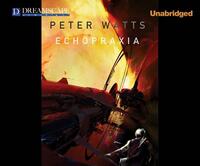Take a photo of a barcode or cover
challenging
mysterious
reflective
slow-paced
Plot or Character Driven:
Plot
Strong character development:
Yes
Loveable characters:
No
Diverse cast of characters:
Yes
Flaws of characters a main focus:
Yes
So... even though I read (listened to) this book before reading its predecessor, Blindsight, it was really good. I was only kind of lost for the first... oh, maybe third of the book... but not enough to make me put it down. Also probably one of the only books where I read (listened to) the post-script all the way through, to give some better background on the concepts within the book and their basis in real science. Very interesting! Bravo, Mr. Watts :)
This is not quite as good as Blindsight, but still has the Watts touch, in terms of weaving in science, immediate at the time of writing, to a plot and concept that spirals out into wider implications, onboarding the reader to the various ramifications of the germination of the core notions. It’s really fun reading just for that. Though, the world is absolutely shot to shit in basically every way possible and it has serious horror undertones. Plus, it clips along nicely. Hard scifi basically never does that.
There are a few darlings though. Vampires. Actual vampires, since this is post humanism, exist. And there is a species gap that is significant. As are the other post human elements, where parts of humanity essentially are no longer human, as they do not experience the world as someone non augmented or altered. And that’s the crux of this novel. The implications of the ways in which technology is already altering us, only rapidly extrapolated into cogent “what ifs”.
But also zombie type people and factions at war, manipulated in a very cyberpunk manner, by machinations they cannot ever perceive, nor will they ever. It’s an idea book, which I think succeeds very well (unlike some Stephenson books I have hated the reading experience of), and I am certainly on the Watts train now. I believe I also have Starfish somewhere.
There are a few darlings though. Vampires. Actual vampires, since this is post humanism, exist. And there is a species gap that is significant. As are the other post human elements, where parts of humanity essentially are no longer human, as they do not experience the world as someone non augmented or altered. And that’s the crux of this novel. The implications of the ways in which technology is already altering us, only rapidly extrapolated into cogent “what ifs”.
But also zombie type people and factions at war, manipulated in a very cyberpunk manner, by machinations they cannot ever perceive, nor will they ever. It’s an idea book, which I think succeeds very well (unlike some Stephenson books I have hated the reading experience of), and I am certainly on the Watts train now. I believe I also have Starfish somewhere.
4.5 stars, actually.
This is the follow up to Blindsight, which blew my mind when I read it with its speculation about different kinds of human consciousness and very, very technical, science-heavy spaceflight descriptions. It had a plot I could follow, however.
Echopraxia was just...confusing. Like all the time. Oh, I can tell you the plot very easily: a biologist goes to Earth's spaceshift reactor with a vampire and some hivemind humans to encounter an alien lifeform.
Yep, that's it. That's the part that's easy to follow. However, as we see through the very human biologist's mind/eyes in this book, and everything about the science, the plots, and the motivations of the folks around him are complicated and layered, its super confusing.
It doesn't help that the author often uses quite poetic and lovely language to describe simple things like "the hatch opened" that requires re-reading to figure out. Nor that most of the dialogue are either metaphysical or science-heavy lectures about the incredible, detailed, amazing, hypothetical future of humanity and its relationship to a dying world, chance at immortality through various technical or medical processes, and theories about consciousness.
I got so lost in these expository bits that I couldn't retain what was actually happening. Even at the end, I only half-guessed what was going on and had to go to Reddit to figure out what I had read. As in Blindsight, Watts likes to set up a diverse cast of cool characters-- and then kill them off. This is a dark book in the end (and throughout, who am I kidding) but in the end it is worth reading despite all the confusion, despite the overly-laden scientific metaphor language, because the kind of futuristic postulations about the shapes humanity may take conversely shed light on what our society today assumes about consciousness, religion, science.
Folks who have read Blindsight will appreciate this look at what was happening on Earth during that book's timeline, as well as a possible explanation for how the vampires kind of took over. If you are not an astrophysicist or mechanical engineer or astronaut, I do recommend that you possibly risk spoilage and read about the book before plunging in, especially if you only half-remember the characters from Blindsight.
This is the follow up to Blindsight, which blew my mind when I read it with its speculation about different kinds of human consciousness and very, very technical, science-heavy spaceflight descriptions. It had a plot I could follow, however.
Echopraxia was just...confusing. Like all the time. Oh, I can tell you the plot very easily: a biologist goes to Earth's spaceshift reactor with a vampire and some hivemind humans to encounter an alien lifeform.
Yep, that's it. That's the part that's easy to follow. However, as we see through the very human biologist's mind/eyes in this book, and everything about the science, the plots, and the motivations of the folks around him are complicated and layered, its super confusing.
It doesn't help that the author often uses quite poetic and lovely language to describe simple things like "the hatch opened" that requires re-reading to figure out. Nor that most of the dialogue are either metaphysical or science-heavy lectures about the incredible, detailed, amazing, hypothetical future of humanity and its relationship to a dying world, chance at immortality through various technical or medical processes, and theories about consciousness.
I got so lost in these expository bits that I couldn't retain what was actually happening. Even at the end, I only half-guessed what was going on and had to go to Reddit to figure out what I had read. As in Blindsight, Watts likes to set up a diverse cast of cool characters-- and then kill them off. This is a dark book in the end (and throughout, who am I kidding) but in the end it is worth reading despite all the confusion, despite the overly-laden scientific metaphor language, because the kind of futuristic postulations about the shapes humanity may take conversely shed light on what our society today assumes about consciousness, religion, science.
Folks who have read Blindsight will appreciate this look at what was happening on Earth during that book's timeline, as well as a possible explanation for how the vampires kind of took over. If you are not an astrophysicist or mechanical engineer or astronaut, I do recommend that you possibly risk spoilage and read about the book before plunging in, especially if you only half-remember the characters from Blindsight.
2/5 for readability.
5/5 for concepts and worldbuilding.
Just like with prequel blindsight, its really hard to follow whats happening at times. Im talking about stuff like where exactly characters are, what environment looks like, what they are/did do, what was/is their plan and how it actually went and was executed, if it even was executed yet. When things go down it feels like its unnecessarily exhausting reading comprehension puzzle/test to follow.
Same goes for whos talking right now. He sets a backforth rhythm of conversation at start, then rarely reminds us whos talking mid conversation so at times you second guess yourself "wait did this character really say this?" and then you have to check from beginning of the conversation.
I would put it on me being dyslexic and english not being my native language but I read a lot of english books and ive read quite consistently for many years just look at my read list... This is something specific to writing style of Peter Watts that just doesnt mix well with my brain.
Which is really shame because when I do comprehend it, its some of my favourite scifi Ive read. Despite action, event and conversational rhythm readability problems, firefall series has some really mind blowing concepts, atmosphere and worldbuilding going on I absolutely love. Its a shame these books crumble on such basic, fundamental levels other less conceptually interesting books don’t.
If therell be third book ill totally read it though, exactly because of these concepts and I am totally now invested in finding out conclusion to this universe peter has built. Maybe peters writing style has changed (or I have changed) by then so that its easier to follow. Ill be also giving a chance to his rifters trilogy.
5/5 for concepts and worldbuilding.
Just like with prequel blindsight, its really hard to follow whats happening at times. Im talking about stuff like where exactly characters are, what environment looks like, what they are/did do, what was/is their plan and how it actually went and was executed, if it even was executed yet. When things go down it feels like its unnecessarily exhausting reading comprehension puzzle/test to follow.
Same goes for whos talking right now. He sets a backforth rhythm of conversation at start, then rarely reminds us whos talking mid conversation so at times you second guess yourself "wait did this character really say this?" and then you have to check from beginning of the conversation.
I would put it on me being dyslexic and english not being my native language but I read a lot of english books and ive read quite consistently for many years just look at my read list... This is something specific to writing style of Peter Watts that just doesnt mix well with my brain.
Which is really shame because when I do comprehend it, its some of my favourite scifi Ive read. Despite action, event and conversational rhythm readability problems, firefall series has some really mind blowing concepts, atmosphere and worldbuilding going on I absolutely love. Its a shame these books crumble on such basic, fundamental levels other less conceptually interesting books don’t.
If therell be third book ill totally read it though, exactly because of these concepts and I am totally now invested in finding out conclusion to this universe peter has built. Maybe peters writing style has changed (or I have changed) by then so that its easier to follow. Ill be also giving a chance to his rifters trilogy.
slow-paced
Plot or Character Driven:
Plot
Strong character development:
No
Loveable characters:
No
Diverse cast of characters:
No
Flaws of characters a main focus:
Yes
adventurous
challenging
dark
mysterious
reflective
slow-paced
Plot or Character Driven:
A mix
Strong character development:
Complicated
Loveable characters:
Complicated
Diverse cast of characters:
Yes
Flaws of characters a main focus:
Yes
Well this one is another mind f*ck and this time free will, zombies and God are major factors! Prepare for a lot of thoughts and some deep internet searching because we have references again which is fantastic. Also I need to read this one again at least twice I think.
mysterious
reflective
medium-paced
Plot or Character Driven:
Character
Strong character development:
Complicated
Loveable characters:
No
Diverse cast of characters:
Yes
Flaws of characters a main focus:
Complicated
It was messy and difficult to follow. The writing hadn't matured at all and I disliked Bruks the whole time and he seemed to get more immature as the book went on. It was as if the author forgot the character he'd created in the beginning and fell into whatever snarky nonsense he needed for the end.
The action sequences are still good and the very very end was interesting, but everything leading up to that was such a mess.
The action sequences are still good and the very very end was interesting, but everything leading up to that was such a mess.
challenging
medium-paced
Plot or Character Driven:
A mix
Strong character development:
Yes
Loveable characters:
No
Diverse cast of characters:
Yes
Flaws of characters a main focus:
Complicated
Very difficult to read this book; the plot was all over the place. I had to read spoilers to understand what I should be gleaning from this book for the most part. What’s brilliant about Blindsight is the clear conversation about consciousness. This book was about religion and god but it didn’t add anything new except, of course the scifi element itself (what if god was a parasite) . But you don’t even know that scifi element until the end, so you aren’t getting any bang around the religious conversation: nothing more than you’d get from reading a bunch of atheist redditors on any given thread. The ending was great, so literally all 2.5 points I’m giving this book are for the ending and because Book 1 was just so good that I don’t want to tank this book completely; people should read it since there will be a Book 3. But otherwise, yes, this book fails completely.
I think I read somewhere that the author will take his time with Book 3 and won’t have deadlines since he’s kept it from his publishers for the most part. I’m guessing that is why Book 2 was written without much care for tying together the plot, theory, or thought-provocation the way Book 1 did (which I gave a rare 5 star rating).
Looking forward to Book 3. Wish he would tear this Book 2 apart and re-write it, tbh.
I think I read somewhere that the author will take his time with Book 3 and won’t have deadlines since he’s kept it from his publishers for the most part. I’m guessing that is why Book 2 was written without much care for tying together the plot, theory, or thought-provocation the way Book 1 did (which I gave a rare 5 star rating).
Looking forward to Book 3. Wish he would tear this Book 2 apart and re-write it, tbh.
dark
reflective
tense
medium-paced
Plot or Character Driven:
Plot
Strong character development:
Complicated
Loveable characters:
No
Diverse cast of characters:
Yes
Flaws of characters a main focus:
No





